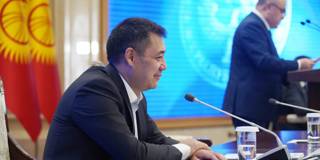After three revolutions in two decades, the Kyrgyz people have proven to be highly effective at toppling corrupt regimes. But if they cannot learn to build as well as they destroy, they will remain perpetually in the dangerous zone between political chaos and state failure.
BISHKEK – After staging three revolutions in two decades, one could argue that the people of Kyrgyzstan have accumulated unique knowledge of how it’s done. Then again, because new problems have emerged each time, there are clearly limits to what experience can offer.
Kyrgyzstan’s latest revolution began in a typical fashion. Following a parliamentary election on October 4, protesters and rioters took to the streets seeking to annul the result, triggering a full-scale political crisis. By October 6, demonstrators had occupied the White House – the government building that houses the president’s office and parliament. In the following days, a peaceful power struggle unfolded. In the end, the Central Election Commission annulled the election results, President Sooronbai Jeenbekov resigned, and Sadyr Japarov, a politician who had just been released from prison, became the acting president.
Meanwhile, as the country’s only remaining independent political body, the parliament had continued to work throughout the protests, enacting legislation to hold a presidential election and a vote on a new constitution on January 10, 2021. This reform was initiated by Japarov himself, prompting his opponents to accuse him of attempting to usurp power and divert the country from the path of democracy.

BISHKEK – After staging three revolutions in two decades, one could argue that the people of Kyrgyzstan have accumulated unique knowledge of how it’s done. Then again, because new problems have emerged each time, there are clearly limits to what experience can offer.
Kyrgyzstan’s latest revolution began in a typical fashion. Following a parliamentary election on October 4, protesters and rioters took to the streets seeking to annul the result, triggering a full-scale political crisis. By October 6, demonstrators had occupied the White House – the government building that houses the president’s office and parliament. In the following days, a peaceful power struggle unfolded. In the end, the Central Election Commission annulled the election results, President Sooronbai Jeenbekov resigned, and Sadyr Japarov, a politician who had just been released from prison, became the acting president.
Meanwhile, as the country’s only remaining independent political body, the parliament had continued to work throughout the protests, enacting legislation to hold a presidential election and a vote on a new constitution on January 10, 2021. This reform was initiated by Japarov himself, prompting his opponents to accuse him of attempting to usurp power and divert the country from the path of democracy.